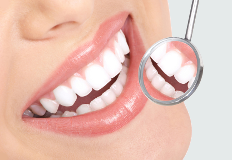Best Preventive Dentistry in Park City, UT
At Mountain High Family Dental, we are the only dental office in Park City to offer a full range of dental services for your entire family, young and old. Our doctors have years of general and cosmetic dental experience.

Keeping your teeth and gums healthy begins with a daily regimen of good oral hygiene. If you practice good dental hygiene, you can expect to experience very few and minor problems with your dental health. The results of not practicing good dental hygiene usually include losing your teeth, painful gum disease and embarrassment because of unattractive teeth. Keep your teeth healthy and your smile brilliant. Start practicing good dental hygiene early and it will help you maintain good dental health throughout your life.
Important dental hygiene tips
- Brush and floss after every meal. Regular brushing and flossing is your number one weapon against tooth loss and gum disease.
- Brush your teeth using small circular motions to get into the small cracks and openings in your teeth. These areas are where infection causing bacteria is most likely to grow.
- Brush thoroughly and floss carefully.
- Use fluoride toothpaste and mouthwash to strengthen the enamel on your teeth.
- Visit your dentist regularly. We recommend visiting our Park City office every six months.
The Dangers of Poor Dental Hygiene
Gum Disease
If you fail to provide adequate care for your teeth and gums you face the risk of serious illness and tooth loss. It’s proven that nearly 90% of all adults will have gum disease at some point in their life. It happens because plaque builds up along the gum line and traps particles of food and bacteria. Gingivitis and periodontitis are serious health conditions that cause infection and your teeth to fall out.
Oral Infections and Thrush
Oral infections are caused by bacteria and thrush is a fungal infection that is often the result of high blood sugar and overuse of antibiotics medications. Medications can also cause a dry mouth that may lead to the formation of cavities. You are much less likely to suffer from these and many other dental health problems if you practice good dental hygiene.

Good dental hygiene care begins long before you actually have teeth. The American Dental Association stresses the importance of good oral hygiene for infants as the best way to prevent future dental health problems. Tooth decay is the most common chronic childhood health issue. It can advance rapidly and cause cavities even in babies with no teeth showing. Starting early with regular visits to a qualified pediatric dentist in Park City gives your child a head start in good dental health.
We Love Babies!!
So bring them in with you when you and your family members come for your appointments. In line with the American Academy of Pediatric Dentists, we recommend bringing your child(ren) to the dentist by no later than their first birthday. Our doctors and dental hygienist will be happy to show you the proper way to clean and care for your child’s teeth and gums. We will be happy to guide you in establishing a good regimen of oral hygiene for your child. We will also make those early dental visits enjoyable for you and your little one, establishing a good foundation for a positive attitude towards future dental visits and care. Starting dental visits in infancy will also enable us to watch for any teeth developing cavities before they become more decayed, and we can teach you about the dental benefits of proper diet and oral hygiene for your child.
Tips and Suggestions for Healthy Baby Teeth
- Using a damp, soft cloth or a soft-bristled toothbrush, wipe clean your baby’s gums and teeth at least twice a day
- Never let your child sleep with a bottle or sippy cup filled with milk or juice since residue from the milk or juice remains in the child’s mouth and on the gums, promoting and promotes the rapid growth of decay causing bacteria.
- When your child is asleep, stop nursing and clean gums and teeth with a damp washcloth
- Try reading, rocking or singing your child to sleep in place of continuous feeding
- Don’t let your child use a sippy cup or bottle as a pacifier
- Wean your child off the bottle by 12 to 14 months
- Teach your child to use a cup at an early age.
- Ask your dentist how much fluoride is appropriate for your child
Pediatric Dentist For Kids & Toddlers
Kids eighteen and under are eligible to join our Smile Rewards Club where they can earn points for good dental habits and other personal accomplishments. Once enrolled, your child will receive a membership card and will begin to immediately earn points for being on time, good brushing, no cavities, community service, writing reviews, referring family and friends to our office and lots of other things. After accruing enough points, prizes can be redeemed. We will tell you all about this amazing program when you call or visit our office.
Bring your child in to our office twice a year for regular cleanings and exams. They will always be happy to hang out in the Kids Kave, have their teeth counted, make sure they do not have any sugar bugs, earn Smile Rewards and dig into our Toy Treasure Chest!! It is our job to make sure that your kids have the best possible experience in our office.
Brushing Tips For Children
Establishing a regular dental hygiene regimen early will build habits that last and preserve your child’s beautiful smile. Using a soft toothbrush, start brushing your child’s teeth as soon as they come in. We recommend brushing with fluoride free toothpaste or water. Once the child learns how to spit, you can switch to fluoride toothpaste. If your water does not contain fluoride, ask our dentists about supplements suitable for your child. Take your time while teaching your child how to brush his or her teeth.
- Use colorful toothbrushes and good tasting toothpaste- your child will receive these at each visit to our office
- Teach them to brush for the right amount of time by using a timer – we will give your child an hourglass time and explain how to use it
- Don’t forget the floss! Early flossing establishes a life long good habit
- Brush and floss your teeth with your children
- Read books and watch videos about good dental hygiene together
- Make a chart and put a gold star on it every time your children brush their teeth
- Reward your child with praise and positive feedback
- After brushing at bed time, allow your child to drink water only.
- Make brushing and flossing time for family fun!
Sealants are a protective coating applied to the biting surfaces of teeth after any staining is removed. The sealant protects the tooth from getting a cavity by shielding against bacteria and plaque. Sealants are most commonly placed on a child’s permanent posterior teeth (molars) because they are more prone to cavities. They can also be placed on adults’ teeth, but most insurance companies won’t cover them.
For many patients regular fluoride treatments can be beneficial. In our office, we use a fluoride varnish to deliver an effective treatment that will remineralize and strengthen weakened areas as well as reduce sensitivity for some patients. Current guidelines indicate that following the discovery of any new decay, fluoride treatments should be provided at each cleaning appointment for a period of no less than three years.
Gum disease, known as Periodontal disease, is an infection of the gum and bone, the tissues that support your teeth. As the gum tissues are damaged, pockets of infection form around them, becoming larger as the infection increases. In the pockets of infection, bacteria excrete toxins, which cause inflammation. As the infection progresses, the gum tissue and bone recede from the teeth, which causes the teeth to become mobile and fall out.
Oral DNA®

Oral DNA® is an extraordinary new procedure offered by Mountain High Family Dental. The Oral DNA salivary diagnostic test identifies the type and concentration of specific perio-pathogenic bacteria that are known to cause periodontal disease. The Oral DNA test helps support the clinician with better risk assessment and personalized treatment options for more predictable outcomes. We are very excited about the benefits of Oral DNA testing and feel that it is one of the more significant dental hygiene developments in the last five years.
The procedure is very easy. And whether you have gum disease issues or not, we recommend that you consider an Oral DNA test, as it is clearly the most effective way to identify and avert serious gum diseases.
The Stages of Gum Disease
- Gingivitis. This is a milder form of periodontal disease. It only affects the gums and is reversible.
- Periodontitis. This stage is a more serious periodontal disease that stems from Gingivitis and can extend into the bone. Periodontitis is one of the main causes of tooth loss.
Factors That Promote Gum Disease
- Smoking or chewing tobacco
- Systemic diseases such as diabetes
- Some types of medications such as steroids, some anti-epilepsy drugs, cancer therapy drugs, calcium channel blockers, and oral contraceptives
- Crooked teeth
- Defective fillings
- Poor fitting Bridges/Crowns
- Pregnancy
Warning Signs of Gum Disease
If you experience any of these symptoms, you should visit your dentist for an examination:
- Red, swollen, tender gums
- Gums that bleed easily
- Gums that have pulled away from teeth
- Persistent bad breath or bad taste in your mouth
- Permanent teeth that are loose or separating
- Any changes in your bite
- Any changes in the fit of your partial dentures
Nightguards are used to treat teeth grinding (bruxism), which can wear down teeth and contribute to temporomandibular joint (TMJ) disorder.
Mouthguards are custom made and prescribed by your dentist to provide a better fit. They are typically worn during sports activities to help protect against broken teeth.
